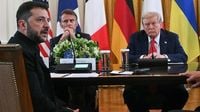The diplomatic chessboard of Europe is in motion once again, as world leaders scramble to set the stage for a possible face-to-face meeting between Ukrainian President Volodymyr Zelenskyy and Russian President Vladimir Putin. With the war in Ukraine grinding into its fourth year, the prospect of a summit between the two adversaries has triggered a flurry of proposals, political maneuvering, and a cascade of questions about security, legitimacy, and the elusive path to peace.
The latest developments began on August 19 and 20, 2025, when European and American leaders accelerated efforts to organize direct talks. According to Reuters and AFP, the urgency stems from a rare alignment: both Zelenskyy and Putin, under the mediation of U.S. President Donald Trump, have expressed readiness to negotiate. The White House has confirmed preparations for a meeting, aiming for the end of August, with Trump playing an active role in brokering the encounter.
But where should such a consequential meeting take place? That question has become a diplomatic flashpoint in itself. Switzerland, with its storied neutrality, was the first to step forward. Swiss Foreign Minister Ignacio Cassis declared his country's willingness to host, emphasizing, as reported by AFP, Switzerland's "past experience of mediating by providing a venue for talks to countries in conflict as a neutral country." Even the thorny issue of Putin's International Criminal Court (ICC) arrest warrant was addressed, with Swiss authorities promising not to execute the warrant should the Russian president attend peace talks in Geneva.
French President Emmanuel Macron quickly threw his weight behind the Swiss bid. In an interview broadcast by LCI and cited by BFMTV, Macron said, "It will be a neutral country, so maybe Switzerland, I support Geneva, or another country." He described the idea of a summit as "more than a hypothesis, it is even a collective will," underscoring the shared European interest in a neutral, secure venue. Macron also recalled the last bilateral talks between the two leaders, which took place in Istanbul, and highlighted the importance of not rushing into a fragile peace, noting the need for robust security guarantees for Ukraine.
Austria, too, has entered the fray. At a special European Union summit, Austrian Chancellor Karl Nehammer offered Vienna as a potential venue, touting the city's "long tradition as a place of dialogue and excellent conditions for international organizations based here – especially the OSCE." According to Vienna Online and UNN, the Austrian government pledged to coordinate with the ICC to ensure Putin's participation, if necessary, stating, "If negotiations take place in Vienna, we will contact the ICC through our headquarters agreements... to ensure President Putin's participation." The proposal was echoed by Austrian Prime Minister Christian Stocker, who noted that Zelenskyy had already discussed the possibility of Vienna as a venue during a visit in June.
Hungary is also angling for a role. A senior U.S. administration official told Reuters that the meeting could take place in Hungary, with Budapest as a possible location. Hungarian Prime Minister Viktor Orban has reportedly expressed hope to host the summit, following a conversation with President Trump. Yet, this suggestion has not been universally welcomed. Polish Prime Minister Donald Tusk, in a pointed post on X (formerly Twitter), referenced the 1994 Budapest Memorandum, which provided security assurances to Ukraine in exchange for relinquishing its nuclear arsenal. "Budapest? Not everyone may remember this, but in 1994 Ukraine already got assurances of territorial integrity from the US, Russia and the UK. In Budapest," Tusk wrote, adding, "Maybe I’m superstitious, but this time I would try to find another place."
The Budapest Memorandum, signed on December 5, 1994, by Ukraine, the United States, the United Kingdom, and Russia, was intended to guarantee Ukraine's independence and sovereignty. However, as the world has witnessed since Russia's annexation of Crimea in 2014 and its full-scale invasion in 2022, those assurances have proven to be paper-thin. The absence of enforcement mechanisms in the memorandum has fueled skepticism about the value of security guarantees, a topic now at the heart of the current peace push.
While the venue debate rages, the leaders themselves are setting conditions and expressing their own preferences. During a 40-minute phone call with President Trump on August 19, Putin reportedly floated Moscow as a possible site for talks. According to Daily Mail, Zelenskyy flatly rejected the idea. Meanwhile, Geneva remains the most frequently cited neutral ground, with both Macron and Swiss authorities signaling strong support.
Security, of course, is paramount—not just for the talks themselves, but for the substance of any agreement that might emerge. UK Prime Minister Sir Keir Starmer, co-chairing a virtual meeting with over 30 international leaders, emphasized the coalition's "shared goal of securing a just and lasting peace for Ukraine." Plans are underway for coalition teams to meet with U.S. counterparts in the coming days to flesh out security guarantees and prepare for a possible reassurance force should hostilities cease.
President Zelenskyy, for his part, has been unequivocal about Ukraine's bottom line. As quoted by Daily Mail, he insisted, "There will be security guarantees." He described the current diplomatic efforts as "a significant step toward ending the war and ensuring the security of Ukraine and our people," and confirmed that national security advisors are in constant contact to hammer out the details.
Not all political actors are convinced of the process. German Chancellor Friedrich Merz, as reported by BFMTV and Reuters, wondered aloud whether "Russian dictator Vladimir Putin would have the determination" to actually meet with Zelenskyy, even as he agreed that the meeting should occur within two weeks. Others, like some UK officials, have voiced concerns that President Trump is too eager for a deal that might favor Russian interests, urging European leaders to "send a message to the Kremlin and indeed the White House, that we are there with Ukraine to the end."
Amid all the diplomatic maneuvering, the reality on the ground remains grim. Even as Putin was assuring Trump of his willingness to negotiate, Russian forces launched a drone attack on Kremenchuk on the night of August 18-19, a stark reminder—according to Daily Mail—that "Putin does not want peace — he wants to destroy Ukraine."
As the end of August deadline approaches, the world watches to see whether this flurry of summit diplomacy will yield tangible progress—or become just another chapter in the long, troubled search for peace in Ukraine. The choice of venue, once a mere logistical detail, has become a symbol of the deeper questions facing Europe and the world: who can be trusted, what guarantees are worth the paper they’re written on, and whether genuine peace is truly within reach.




